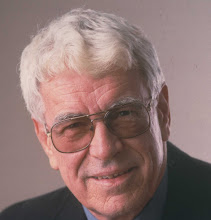The bullet, said Johnny Mauger, went in one side of his friend's head, but it didn't quite come out the other. Johnny tapped his temple. The bullet made a little bulge, like a pimple, right here. His voice was soft and sad as he remembered his friend, another young kid from Cape Breton, dead in a European trench.
Johnny's story is in The Crimson Flower of Battle, a television documentary that my friends Charlie Doucet, Scott Macmillan and I created in 1995, telling the stories of the men and women of Isle Madame during the war which had ended exactly 50 years earlier. The vets will never talk to you, their families said. Johnny absolutely refuses to talk about the war. But when I asked him, Johnny thought for a moment and then he said Yes. He and his comrades were getting old, and they needed to record their stories.
What stories they were. Boys of 16 on convoy ships, watching other ships exploding, the water burning, dying men screaming. Ships entering Liverpool after Dieppe with their scuppers running red with blood. Ace pilots telling themselves they were shooting down airplanes, not men. Slave labourers from Petit de Grat building the airport in Hong Kong.
Funny stories, too. Being captured by the Germans three times in a single day as the front line surged forward and back. Flying a plane under -- that's right, under -- the Eiffel Tower. Looking beneath your tank after an air raid, and discovering a schoolmate from Arichat hiding there. Love stories, and war brides from England and Holland living quietly in Isle Madame.
I loved those people, their quietness, warmth and humility. And Johnny was right. Thirteen years later, very few survive. I remember them every November. Indeed, I remember them all the time.
On November 2, we celebrated Muriel Duckworth's 100th birthday with a fund-raising concert for Oxfam at the Rebecca Cohn Auditorium in Halifax. The concert -- called Stand Up! Speak Out! -- began with a reception featuring 100 birthday cakes. The crowd was a virtual roll call of Nova Scotia's movement for peace and justice.
The Women of We'koqma'q opened the show with drumming and singing. They were followed by the Truro Youth Singers, the Aeolian Singers, the Gaia Singers, the Raging Grannies and Four the Moment. The show included Muriel's own words about peace and justice, about opera, about marriage and children. We heard a moving tribute to Muriel's husband, the late Jack Duckworth. The afternoon concluded with a song written for Muriel by Rose Vaughan and Cheryl Gaudet.
The concert reflected Muriel's lifelong opposition to every form of injustice -- racism, sexism, poverty, disease, exploitation of all kinds. But no cause is nearer to her heart than peace. She and Jack Duckworth were pacifists during World War II, which demanded great courage, and she has been a passionate, tireless peace activist all her life.
As the Faithful Reader knows, every Christmas Marjorie and I give minor gifts to the people we love, and a larger gift to a worthwhile charity. This year, in Muriel's honour, we'll give that contribution to Oxfam's Jack and Muriel Duckworth Fund for Active Global Citizenship.
The days after the concert rightly belonged to the veterans. But I kept feeling an imbalance in the remembrances, a ghostly absence in the documentaries and newspaper stories and silences. I wanted people like Muriel Duckworth at the cenotaphs, to remind us that even a just war represents a tragic human failure -- and that in most wars, the nobility of the soldiers greatly outstrips the nobility of the cause. There are soldiers on both sides, after all.
I remember December 31, 1999, watching on television as the new millennium arrived in a wave that rolled clear around the globe. From every nation, in every language, in song and speech and poem, when the human race declared its most profound wish for the new millennium, we spoke -- we, the people of the earth -- with a single voice. What we want, we said, is peace.
That wish should be part of our remembrances. We best honour the ones we lost to war when we dedicate ourselves to peace. Then, and only then, we can tell our veterans this: You did not suffer in vain.
-- 30 --
Silver Donald Cameron's interview with Stephen Clare is now running on www.haligonia.ca
Subscribe to:
Post Comments (Atom)

No comments:
Post a Comment